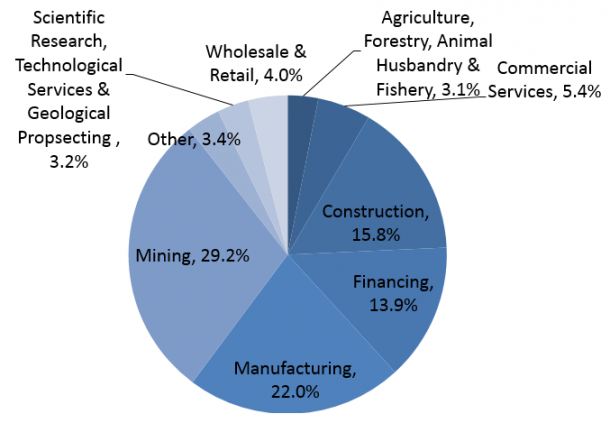O impacto da economia chinesa em África
Publicado16 Mar 2015

Composition of outward Chinese FDI stock in Africa (2009). Source: Chinese Ministry of Commerce, National Bureau of Statistics, State Administration of Foreign Exchange, 2010
De que forma o desenvolvimento da economia chinesa afecta o continente africano? Qual é a estratégia de África em relação à China? Como funcionam as economias locais num mundo global? Martyn Davis, consultor e especialista em mercados emergentes de fronteira, publica no site do World Economic Forum um artigo desenvolvido sobre estas questões.
The African continent continues to struggle to develop its domestic economies through beneficiation and, by and large, sub-Saharan African countries remain dependent on raw material extractive industries, often being single-commodity dependent. Ironically, the China-driven commodities “super cycle” over the past decade or so may have reinforced the resource dependence of African states.
Despite this, China’s resource-intensive growth model has helped African growth – underpinning the “Africa rising” narrative that has emerged in recent years.
Furthermore, in 2008 Beijing’s financial authorities used a sizeable stimulus of approximately $570 billion to pump-prime economic growth. This was in response to rapidly slowing global growth following the financial crisis, and it had a very positive knock-on effect on Africa’s growth trajectory. Ironically, China’s actions reinforced Africa’s commodity dependence, with strong commodity prices providing a deterrent – or at the very least a distraction – for African policy-makers to accelerate their efforts towards diversification.
But changes now impacting the Chinese domestic economy hold out a new promise for aspirational African economies. The rising cost pressures on China’s light industrial manufacturing sector will increasingly lead to manufacturing capacity to relocate to lower-cost foreign economies over the long term. This trend of Chinese “hollowing out” of low-end manufacturing and offshoring to Africa is likely to be the next driving force of the relationship. This forms part of what is often referred to as China’s “economic rebalancing”. If this opportunity is seized by progressively reformist African states, they could well be on the cusp of a 19th-century style industrial revolution – generating jobs and creating new industries.
O artigo completo em What China’s economic shift means for Africa
